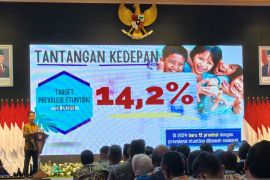It does not increase. The stunting rate nationally (since 2021) has dropped to 24.4 percentSijunjung, West Sumatra (ANTARA) - As a metaphorical gift on the commemoration of Pancasila Day, the stunting rate among children did not show an increase despite the COVID-19 pandemic, the National Population and Family Planning Agency (BKKBN) stated.
"It does not increase. The stunting rate nationally (since 2021) has dropped to 24.4 percent," BKKBN Head Hasto Wardoyo noted in here, on Tuesday.
Wardoyo pointed out that following the third year of the COVID-19 pandemic, several districts in Indonesia still had a rate of stunting prevalence that exceeded the national rate.
For instance, although the overall rate of stunting in West Sumatra had reached 23.3 percent, the rate in Sijunjung District was recorded at 30.1 percent.
Related news: National Family Day offers momentum to reduce stunting rates: BKKBN
However, based on national monitoring conducted by his administration, the number of children experiencing stunting had not increased again.
Wardoyo added that the stunting rate did not increase, but the number of cases of child wasting, or a condition in which a child is too thin for his or her height, had increased, although he did not furnish further details on the figure.
"During COVID, there is the term ‘wasting’. The number of underweight babies is increasing, but it takes time to ensure if it was really stunting (condition). After being thin for a long time and (having shown no signs of) growing tall, with COVID-19 having lasted for more than two years, it would have an impact," he stated.
He also noted that as an effort to prevent stunting in children, the community was able to understand two important factors that contributed to stunting, such as environmental effects comprising toilet conditions, availability of clean water, and healthy and clean homes for children.
Related news: BKKBN head accentuates critical role of midwives in stunting handling
The second factor was specific or related to family health. For instance, due to the lack of immunization in children, they were often affected by diseases and/or mothers were afflicted with anemia.
In order to create a future generation of good quality, cross-sectoral convergence is deemed necessary to be improved, as this was one of the keys to address the stunting problem.
"Convergence must be narrowed. Hence, like the Public Works and Public Housing Ministry, it also targets families that are affected by stunting. It is (focused) there. Then let us say there is a social affairs office. There is the Family Hope Program, there is non-cash food assistance that is (focused on) directed to families that are at risk of stunting. This is cross-sectoral," he concluded.
Related news: VP expects Indonesia to have golden generation in 2045
Related news: Family planning crucial investment for future generations: BKKBN
Translator: Hreeloita D S, Mecca Yumna
Editor: Fardah Assegaf
Copyright © ANTARA 2022












